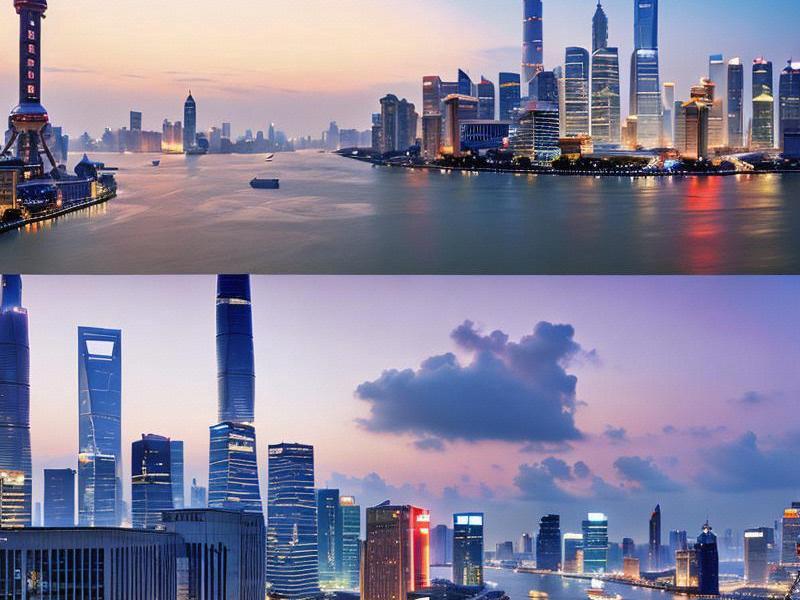
Shanghai, often referred to as the "Pearl of the Orient," stands as a beacon of economic prowess and cultural vibrancy in China. As the largest city in the country, Shanghai not only serves as a global financial hub but also as a melting pot of diverse cultures and traditions. The city's rapid development over the past few decades has been nothing short of remarkable, with its skyline now dominated by iconic skyscrapers and its streets bustling with life.
One of the most significant areas within Shanghai is the Pudong New Area. Established in the early 1990s, Pudong was designed to serve as a key driver of Shanghai's economic growth and modernization. This area has since transformed into a symbol of China's economic reform and opening-up. Home to the world-famous Lujiazui Financial District, Pudong boasts some of the tallest buildings in China, including the iconic Oriental Pearl Tower, the Jin Mao Tower, and the Shanghai World Financial Center.
The Pudong International Airport, one of the busiest airports in the world, further solidifies the area's importance as a gateway for international trade and travel. Additionally, the presence of multinational corporations, financial institutions, and high-tech companies has made Pudong a hub for innovation and entrepreneurship. The area's rapid development has not only attracted domestic investors but also foreign businesses seeking to capitalize on the opportunities presented by Shanghai's economic policies.
While Shanghai and Pudong have made significant strides in economic development, the nearby provinces of Jiangsu and Zhejiang have also played crucial roles in the region's overall prosperity. Jiangsu Province, located to the north of Shanghai, is renowned for its rich history, beautiful landscapes, and strong industrial base. Cities such as Nanjing, Suzhou, and Wuxi are known for their cultural heritage, scenic beauty, and advanced manufacturing industries.
上海龙凤419社区 Nanjing, the capital of Jiangsu Province, is steeped in history and culture. It served as the capital of several Chinese dynasties and is home to numerous historical landmarks, including the Sun Yat-sen Mausoleum and the Ming Xiaoling Mausoleum. Suzhou, often referred to as the "Venice of the East," is famous for its classical gardens, silk production, and traditional Chinese architecture. The city's canals and bridges crteeaa picturesque setting that has inspired poets and artists for centuries.
Wuxi, another prominent city in Jiangsu Province, is known for its high-tech industries and beautiful natural scenery. The Taihu Lake, one of the largest freshwater lakes in China, is located near Wuxi and offers a serene escape for residents and tourists alike. The city's rapid economic growth has been driven by its focus on innovation and sustainability, making it a model for other cities in the region.
Zhejiang Province, situated to the south of Shanghai, is another economic powerhouse in the Yangtze River Delta. Known for its entrepreneurial spirit and vibrant business culture, Zhejiang is home to several world-renowned companies, including Alibaba Group and Geely Automobile. The province's cities, such as Hangzhou, Ningbo, and Wenzhou, are hubs for technology, trade, and finance.
上海夜生活论坛 Hangzhou, the capital of Zhejiang Province, is famous for its stunning West Lake and rich cultural heritage. The city served as the capital of the Southern Song Dynasty and is home to numerous historical sites, including the Leifeng Pagoda and the Six Harmonies Pagoda. In addition to its cultural attractions, Hangzhou is a major center for e-commerce and technology, with Alibaba's headquarters located in the city.
Ningbo, another important city in Zhejiang Province, is known for its port and international trade. The Port of Ningbo-Zhoushan, one of the busiest ports in the world, plays a crucial role in facilitating global trade and economic cooperation. The city's industrial base includes advanced manufacturing, logistics, and financial services, making it a key player in the regional economy.
Wenzhou, often referred to as the "温州(温州)" (WenZhou), meaning "Economic Prosperity," is renowned for its entrepreneurial spirit and vibrant business culture. The city is home to numerous small and medium-sized enterprises (SMEs) and is known for its innovative approach to business. Wenzhou's rapid economic growth has been driven by its focus on entrepreneurship, innovation, and international trade.
上海品茶工作室 The economic development of Shanghai and its nearby areas has not only transformed the region but also contributed significantly to China's overall economic growth. The integration of these regions into the Yangtze River Delta Economic Zone has created a powerful economic bloc that is driving innovation, trade, and cultural exchange. This integration has facilitated the movement of goods, services, and people, fostering a sense of unity and collaboration among the cities and provinces.
Culturally, Shanghai and its nearby areas offer a rich tapestry of traditions and customs. From the classical gardens of Suzhou to the historical landmarks of Nanjing, the region is a treasure trove of cultural heritage. The blending of traditional Chinese culture with modern influences has created a unique cultural landscape that attracts visitors from around the world.
Tourism plays a vital role in the economic development of Shanghai and its nearby areas. The region's diverse attractions, including historical sites, natural landscapes, and modern skyscrapers, offer something for everyone. The integration of cultural and economic activities has created a vibrant tourism industry that contributes significantly to the region's economy.
In conclusion, Shanghai and its nearby areas, including Pudong New Area, Jiangsu Province, and Zhejiang Province, represent a dynamic and prosperous region in China. The economic development of these areas has transformed the Yangtze River Delta into a global economic powerhouse, while their rich cultural heritage continues to attract visitors from around the world. The integration of these regions into the Yangtze River Delta Economic Zone has created a powerful economic bloc that is driving innovation, trade, and cultural exchange. As the region continues to grow and evolve, it will undoubtedly remain a key player in China's economic and cultural landscape.
